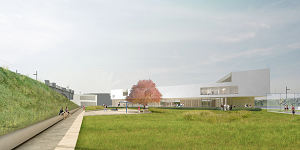The municipality of Forest in the Brussels region has put 970 m² of facilities at the disposal of the FOR.E.T. non-profit organisation for use as a training and reintegration centre for under-qualified young people seeking work in the high-end hospitality and catering sectors.
- 12 December 2014
The Divercity project has enabled the Forest municipality to transform an industrial wasteland into a hub which is open to all, and which offers local residents a crèche, a centre for the elderly, a 4000 m² park and hospitality and catering training centres. Foresthoreca will provide high-quality training for around 100 people a year in a growing sector in the Brussels Region.
Training provision for students and people lacking qualifications is an essential ingredient in fostering social inclusion, jobs, education and training. The Forest municipal authorities recognised training and support for job seekers in re-entering the labour market as a top priority for their municipality. The training centre was thus integrated into the Divercity project, which aims to revitalise the old industrial Pont de Luttre area of Forest by transforming it into a sustainable public space hosting a range of amenities for the benefit of local residents.
The municipal authorities acquired the site for the project in December 2011. Construction of an energy-efficient building in a contemporary style, which is easily accessible by public transport, began in January 2014. Foresthoreca is to occupy the ground and first floors of the building.
Practical training in a high-end restaurant and snack bar
The training is intended primarily for students and people without qualifications, who are looking to re-enter the workforce, particularly women with young children. Foresthoreca training is of a highly practical nature as the centre contains a high-class training restaurant and a snack bar managed by a local development and employment initiative, both of which are open to the public. This should help trainees to acclimatise to work situations, and improve the quality of training provision in the sector, while also leading to the creation of new jobs.
Four types of courses are to be provided covering initial training, as well as kitchen, waiting and housekeeping work. Foresthoreca is expected to train around 100 people annually, with the aim of enabling at least 80 % of them to subsequently find work in the catering and hospitality sectors.
Total investment and EU funding
Total investment for the project “Foresthoreca” is EUR 3 771 425, of which the EU’s European Regional Development Fund is contributing EUR 2 400 000 from the Operational Programme “Brussels Capital Region” for the 2007 to 2013 programming period.

